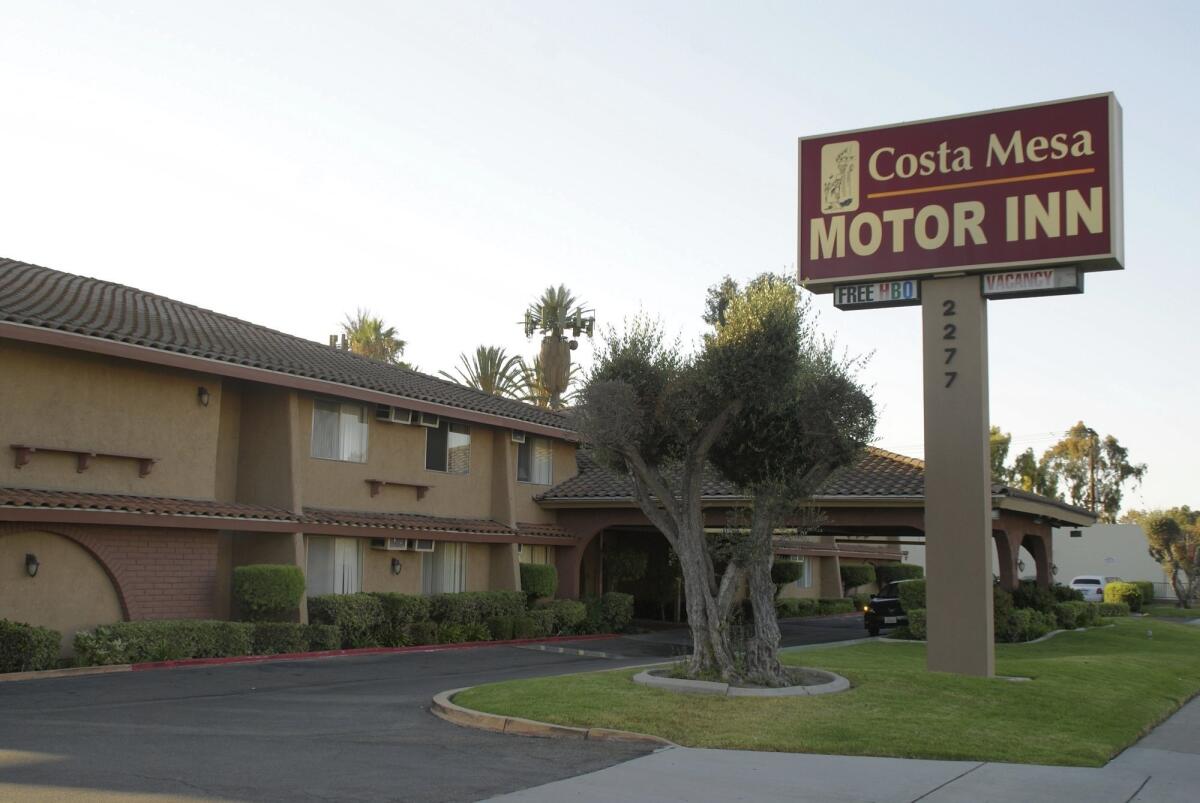Court upholds Costa Mesa’s limits on long-term motel stays

Costa Mesa can, for now, keep enforcing an ordinance restricting long-term stays at motels, despite a legal challenge alleging that the regulations unfairly target low-income residents.
Orange County Superior Court Judge Gregory Lewis denied a request for an emergency restraining order to prevent city officials from enforcing the law, which limits most motel stays to 30 days.
The Public Law Center, a Santa Ana-based pro bono law firm, asked for the order as part of a lawsuit it filed this week on behalf of a group of motel residents.
The group contends that the ordinance exacerbates a shortage of low-income housing in the city and violates state and federal housing and disability laws.
“For years, the motels have acted as a much-needed safety net for people facing financial hardship as a result of losing their jobs or work-related injuries,” according to a statement from the Public Law Center.
Under the regulations, motel owners must apply for a conditional use permit to allow any new long-term tenants. To be granted a permit, the motel must meet requirements such as providing on-site laundry, installing kitchens in every rental and having at least 75 rooms.
“By enacting the ordinance, Costa Mesa has targeted and discriminated against its neediest residents,” the lawsuit states.
After briefly hearing arguments, Lewis declined Tuesday to grant the restraining order and told the Public Law Center’s lawyers that they should have filed their motion earlier, considering that the Costa Mesa City Council passed the ordinance in August and it took effect in early September.
The sides will meet in court again for a nonemergency hearing to start moving the suit forward.
In court, attorney Mark Erickson highlighted the story of Sally Ozuna, a 72-year-old woman with a failing liver who tried to live at the Costa Mesa Motor Inn on Harbor Boulevard.
“We simply do not have the money to pay for first and last month’s rent and security deposit on an apartment,” Ozuna, who uses a wheelchair, wrote in a declaration.
She and her caretaker son moved away from Costa Mesa after the city told them they would have to leave the room they had rented within 30 days, according to the declaration.
“I cannot handle the physical labor of monthly moves from motel to motel without worsening my health,” Ozuna said.
But she acknowledged that the ordinance didn’t force her into homelessness, Chris Neumeyer, the city’s attorney, pointed out to the judge: “They haven’t shown anybody who was kicked out on the street who is now homeless because of this law.”
Costa Mesa Mayor Jim Righeimer, who led a 3-2 City Council vote authorizing the ordinance, said it’s a misinterpretation to think the law is driving out poor residents.
“We care about these people more than they might realize,” he said, adding that the city is working with nonprofit partners to look for long-term housing options.
The idea behind the ordinance was to make long-term residents periodically take stock of their lives and consider where else they could live for the inflated amount they pay per square foot at a motel, Righeimer said.
Erickson said in court that Righeimer’s stated intent was discriminatory and would help the plaintiffs prevail at trial.
“The mayor speaks as if all of his city’s residents have a choice in being poor and, after evaluating their life at the end of 30 days, they can then magically live in a house or an apartment,” Public Law Center attorney Lili Graham said in a statement. “That is not the reality for our clients.”
jeremiah.dobruck2@latimes.com
Twitter: @jeremiahdobruck
More to Read
Get the Latinx Files newsletter
Stories that capture the multitudes within the American Latinx community.
You may occasionally receive promotional content from the Los Angeles Times.







